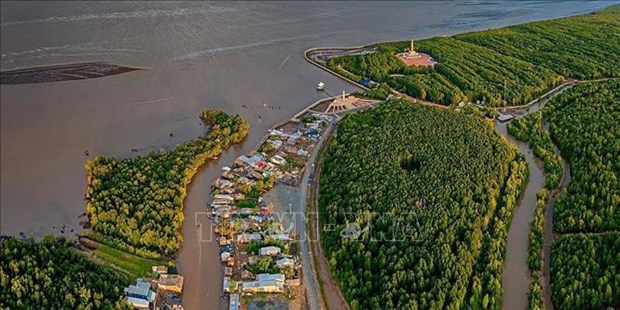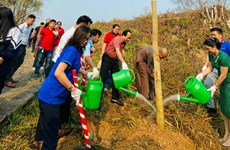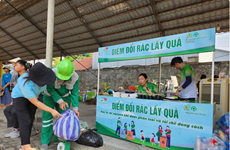Efficient, sustainable use of water resources matters to Mekong Delta
In recent years, residents in the Mekong Delta, one of the world’s three largest deltas, have seen growing climate change impacts on local water resources and their livelihoods.
 An aerial view of Ca Mau Cape in the Mekong Delta province of Ca Mau (Photo: VNA)
An aerial view of Ca Mau Cape in the Mekong Delta province of Ca Mau (Photo: VNA)Experts from the Institute for Environment and Natural Resources at the Vietnam National University, Ho Chi Minh City, pointed out that the Mekong Delta which used to boast rich groundwater potential and benefiting from the alluvium and freshwater from the upper river is now facing groundwater degradation.
Studies showed that groundwater levels have dropped sharply, by 0.3 - 0.5 metre per year in many localities in regional localities such as Can Tho, Long An, Tien Giang, Soc Trang, Tra Vinh, Vinh Long, and Ca Mau. The decline even reached 0.55 metre per year in Tan Tru township of Tan Tru district (Long An province) and 0.92 metre per year in Lai Vung township of Lai Vung district (Dong Thap province).
Assoc. Prof. Nguyen Hong Tien, Vice Chairman and Secretary General of the Vietnam Water Supply and Sewerage Association, said managing the use of water resources in the Mekong Delta is greatly critical to the common development of Vietnam. Over the past years, thanks to the State’s investment, international organisations’ effective support, and especially locals' active participation, many clean water facilities have been built in both urban and rural areas, thus raising the rate of people accessing clean water.
However, he noted, the Delta is still facing a shortage of freshwater as supply facilities and surface water are contaminated with saltwater which leads to the groundwater degradation. The shortage has also adversely impacted every socio-economic aspect.
The Permanent Office of the Vietnam National Mekong Committee forecast in 2022, this region will continue experiencing a dry season with water scarcity, similar to what happened last year.
Experts emphasised that efficient and sustainable freshwater use to ensure freshwater sufficiency for the entire region is a necessary move, recommending localities in the Delta rationally tap into the potential of brackish water and saltwater in coastal areas to serve socio-economic development.
Meanwhile, to reduce saltwater intrusion risks as a result of tidal surges and rising sea levels, it is needed to carry out fully-constituted structure solutions for controlling saltwater and freshwater in a proactive and effective manner, they said, adding that it is highly important to complete and synchronise the local irrigation infrastructure system in order to mitigate water and climate-related risks, and to efficiently use water resources here.
In addition, developing a regional-scale and scattered water storage system is a thorough solution to drought and saltwater intrusion in the dry season in the Mekong Delta, experts said./.












